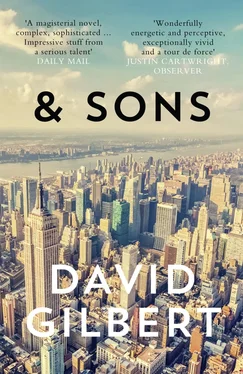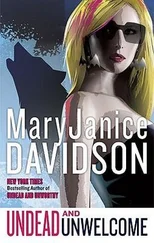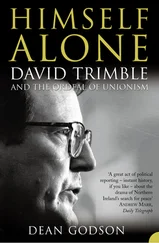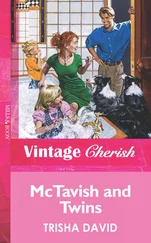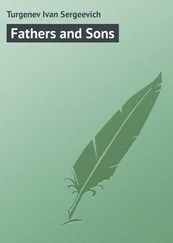“A ten-grand ashtray,” my sister muttered during the arrangements.
“She also bought a plot at Woodlawn,” my brother muttered right back.
“Hate to think how much that cost.”
“Fifty thousand, not including annual upkeep.”
“Unbelievable.”
“And then there’s the headstone.”
The prospect of an inheritance had made them both accountants.
I was—or am—Charles Henry Topping’s second son, the youngest of three. Grace and Charles Jr. were ahead of me respectively and literally: Grace commanded the second pew, her whole family jammed together, the six of them sour yet insistent, like the richest people flying coach, while behind her sat Charles Jr., never Charlie or Chuck, with his two girls, the ever blond and blonder copies of his wife, who was six months pregnant with what I could only imagine was a blinding ball of blazing white light. Then there was me, Philip, the momma’s boy without his momma. I was bookended by my five-year-old son and seven-year-old daughter, both of whom dressed like tiny adults mourning their lost childhood. I hadn’t seen them in a few weeks. I always suspected that I could be a bad husband, a bad son, but I always assumed that I would be a good father. Rufus and Eloise were so well behaved as to be almost offensive. This was the consequence of their angry yet polite mother, who was somewhere in this church waiting for the service to end so she could swoop in and whisk her babes back home. Ashley was probably crying herself. She was fond of my father, and in his quiet way he was fond of her. “She is well built,” he once told me, the opinion having nothing to do with her figure but rather with her overall form. And maybe Ashley was thinking of my mother, a woman she got along with spectacularly well (my mother had an ease with making people feel warm and welcome, though her children were often dubious of her actual impressions), and of course seeing all of these people, the old Topping crowd, many of whom had attended our own wedding ten years before—well, it must’ve been hard for her. We were the ridiculous subplot: the cheating husband, the betrayed wife, the poor poor children. Yes, Ashley was probably crying while all I could do was stare at that coffin and picture the closed mouth of a giant clam, a charred bit of irritant within its velvety folds. As the Exeter motto states, Finis Origine Pendet .
But where was the beginning?
I have no idea what my father was like as a boy, or a teenager, or a young man. Even today I find myself poring over the novels of A. N. Dyer in search of possible clues to his other life: the aforementioned Cooley from Ampersand , but also Richard Truswell from Pink Eye and Killian Stout from Here Live Angry Dogs and Brutal Men . I’ll study these characters and I’ll think, Maybe that’s him, in Truswell’s tragic decency, in Stout’s oppressed desires, both their lives slowly collapsing under the strain until a seemingly minor act brings them down. But my father never buckled. He was consistently unsurprising. But just last year I learned he had a stammer growing up, and this news hit me hard, like adding pastel to a police sketch. Fathers start as gods and end as myths and in between whatever human form they take can be calamitous for their sons. I have no first memory of the man, only a mild impression of him sitting safely behind a newspaper, the back of his head leaving an ever-present mark on the chair, his oily shadow. I first learned about current events by staring at him silently, waiting for the paper to twitch down. Those poor expectant sons. And who knows what my son sees when he closes his eyes around me? The trip to the natural history museum, where he caught me weeping? But this story, however poorly realized, is not about me or my father or my own son, though we make our appearances; no, this story is about the man in the first pew, the important man, the man who will live on while the rest of us will fade under the raised arms of a Reverend Rushton somewhere.
“You may be seated,” he said.
The eulogy came first. It took nearly a minute for A. N. Dyer to trudge up to the lectern—even my youngest strained for a view—and I remember thinking, What’s happened to him? His spirit no longer seemed to reach his extremities but pooled around his torso and only fed the essentials. I had last seen him a month earlier, when he visited my father on a Saturday in mid-February. He showed up at the apartment in a knit cap and a wool overcoat and still resembled one of those timeless preps, ruddy and lean, who wore their old age the way a mischievous boy might wear a mask.
“Philip,” he stated solemnly as I opened the door. It forever amazed me that he knew my name, even if he was my godfather. “Freezing out there,” he told me.
“I know, unbelievable,” I said.
That February was an ice age in miniature. Andrew asked if I had a fire burning, I said no, so he clapped his hands and requested a drink. We went into the library, where he browsed through the brown offerings before pouring himself a glass of Glenfiddich. A moment was spent admiring the complete set of miniature ducks and shorebirds carved by Elmer Crowell and lovingly displayed in specially crafted vitrines. Crowell was a master decoy maker, though neither my siblings nor I had any idea of his name let alone his reputation until three years ago, when we put the entire collection up for auction. It was, in certain circles, a big deal. I myself always found them embarrassing, a notch above toys; where other families had real art, in some cases serious art, we had a Very Plump Black-Bellied Plover by Obediah Verity. And my father didn’t even hunt.
“I’ve always liked this room,” Andrew commented. “So very marshy.”
“I suppose.”
“You know your grandfather was quite the shot.”
“That’s what I’ve always heard.”
“Famous for it really. Practically his career. That and tennis and golf and fishing and drinking. And don’t forget the women. He was one sporty bastard, always on the lookout for something to catch or kill or thwack.” Andrew stopped in front of a black duck carved by Shang Wheeler, its surface worn from years of working the water, a half-million-dollar patina. He touched its smooth head. “It does seem an honest art form, in terms of endgame.” He mimed a shotgun and blasted the air. “I for one always missed. They told me I was wrong-eyed, whatever that means, plus I tended to aim too low.” His arched mouth wrapped a certain drawl around his words, a lockjaw that stretched back to the earliest Dutch diphthongs. It was a handsome if easily ridiculed voice, a fellow writer once claiming that A. N. Dyer spoke as if he had Quaaludes stuffed in his ears. “Sorry I haven’t visited as much as I should,” he said.
“Please.”
“Been busy.”
“I’m sure.”
“How are the wife and kids?”
“Fine,” I said, which at the time was true.
“And are those Buckley bums still sucking their thumbs?”
I nodded, privately ashamed of my fallback career though publicly proud of my noble profession. A few years had stretched into an almost unfathomable fifteen of teaching fifth grade at that most patrician of New York elementary schools, three generations’ worth of Topping and Dyer boys on its rolls. I would soon get fired.
Andrew lifted his glass. “Life as an educator, very honorable.”
Perhaps too defensively I told him that I was still writing, stubborn despite the rejections, that I was working on a novel about the Cuban Missile Crisis and the dawning generation gap, that in fact I was taking a sabbatical next year so I could get a good solid draft down. Like a stage mother I pushed my other self forward.
“Good for you,” Andrew said, politely uninterested.
Читать дальше
